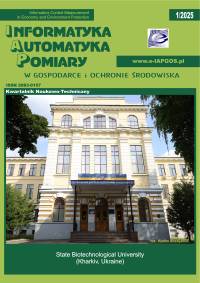ANALIZA METOD REKOMENDACJI TREŚCI W SERWISACH INFORMACYJNYCH
Oleksandr Necheporuk
Sumy State University (Ukraina)
https://orcid.org/0000-0002-9905-031X
Svitlana Vashchenko
Sumy State University (Ukraina)
Nataliia Fedotova
n.fedotova@cs.sumdu.edu.uaSumy State University (Ukraina)
https://orcid.org/0000-0001-9304-1693
Iryna Baranova
Sumy State University (Ukraina)
https://orcid.org/0000-0002-3767-8099
Yaroslava Dehtiarenko
Lublin University of Technology (Polska)
Abstrakt
Przedmiotem badań jest proces wyboru metody rekomendacji treści w serwisach informacyjnych. Trafność badania wynika z szybkiego rozwoju zasobów informacyjnych i rozrywkowych oraz wzrostu ilości danych, na których działają, dlatego w celu utrzymania uwagi użytkownika wykorzystywane są systemy rekomendacyjne. Biorąc pod uwagę różne rodzaje treści, konieczne jest rozwiązanie problemu filtrowania danych na podstawie ich charakterystyki i preferencji użytkownika. Aby rozwiązać problem, przeanalizowano metody filtrowania treści, filtrowania kooperacyjnego z wykorzystaniem różnych technik (technika oparta na modelu, technika oparta na pamięci i hybrydowa technika filtrowania kolaboracyjnego), filtrowanie oparte na wiedzy oraz metody filtrowania hybrydowego. Biorąc pod uwagę zalety i wady każdej metody, wybrano metodę hybrydową wykorzystującą filtrowanie kolaboracyjne oparte na modelu i filtrowanie oparte na treści do przyszłego rozwoju proponowanego uniwersalnego systemu rekomendacji.
Słowa kluczowe:
system rekomendacji oparty na treści, system rekomendacji oparty na współpracy, hybrydowy system rekomendacjiBibliografia
[1] Akbar A., Agarwal P., Obaid A. J.: Recommendation engines-neural embedding to graph-based: Techniques and evaluations. International Journal of Nonlinear Analysis and Applications 13(1), 2022, 2411–2423 [https://doi.org/10.22075/IJNAA.2022.5941].
Google Scholar
[2] Aldossary A.: Recommender Systems Principles and methods in Web 2 Applications An analytical view of the filters used in YouTube. Multi-Knowledge Electronic Comprehensive Journal For Education And Science Publication (MECSJ), 37, 2020.
Google Scholar
[3] Ameen A.: Knowledge based Recommendation System in Semantic Web-A Survey. International Journal of Computer Applications 182(43), 2019, 20–25.
DOI: https://doi.org/10.5120/ijca2019918538
Google Scholar
[4] Bertini M. et al.: Keeping up with the Influencers: Improving User Recommendation in Instagram using Visual Content. UMAP 2020 Adjunct – Adjunct Publication of the 28th ACM Conference on User Modeling, Adaptation and Personalization, 2020, 29–34 [https://doi.org/10.1145/3386392.3397594].
DOI: https://doi.org/10.1145/3386392.3397594
Google Scholar
[5] Chu W. T., Tsai Y. L.: A hybrid recommendation system considering visual information for predicting favorite restaurants. World Wide Web 20(6), 2017, 1313–1331 [https://doi.org/10.1007/S11280-017-0437-1/METRICS].
DOI: https://doi.org/10.1007/s11280-017-0437-1
Google Scholar
[6] Gohari F. S., Tarokh M. J.: Classification and Comparison of the Hybrid Collaborative Filtering Systems. International Journal of Research in Industrial Engineering 6(2), 2017, 129–148 [https://doi.org/10.22105/RIEJ.2017.49158].
Google Scholar
[7] Korotaev A., Lyadova L.: Method for the development of recommendation systems, customizable to domains, with deep GRU network. Proceedings of the 10th International Joint Conference on Knowledge Discovery, Knowledge Engineering and Knowledge Management – IC3K 2018, 2018, 231–236 [https://doi.org/10.5220/0006933302310236].
DOI: https://doi.org/10.5220/0006933302310236
Google Scholar
[8] Kwan C., Koh’s M. Q., Jasser M. B.: A Comparison Study Between Content-Based and Popularity-Based Filtering via Implementing a Book Recommendation System. International Journal Of Advanced Research In Engineering & Technology 11(12), 2020, 1121–1135 [https://www.researchgate.net/publication/348190964_A_Comparison_Study_Between_Content-Based_and_Popularity-Based_Filtering_via_Implementing_a_ Book_Recommendation_System] (available: 10.05.2016)
Google Scholar
[9] Madathil M.: Music Recommendation System Spotify-Collaborative Filtering Mithun Madathil, 2017.
Google Scholar
[10] Mohammed Al Mani I. A.: Collaborative filtering recommendation system: Comparison study (M.Sc. Thesis, Altinbaş University). 2018. [http://openaccess.altinbas.edu.tr/xmlui/handle/20.500.12939/1724] (available: 10.05.2016).
Google Scholar
[11] Mustafa N. et al.: Collaborative filtering: Techniques and applications. Proceedings of International Conference on Communication, Control, Computing and Electronics Engineering – ICCCCEE 2017 [https://doi.org/10.1109/ICCCCEE.2017.7867668].
DOI: https://doi.org/10.1109/ICCCCEE.2017.7867668
Google Scholar
[12] Naumov M. et al.: Deep Learning Recommendation Model for Personalization and Recommendation Systems. 2019.
Google Scholar
[13] Ni X. et al.: Feature selection for Facebook feed ranking system via a group-sparsity-regularized training algorithm. Proceedings of International Conference on Information and Knowledge Management, 2019, 2085–2088 [https://doi.org/10.1145/3357384.3358114].
DOI: https://doi.org/10.1145/3357384.3358114
Google Scholar
[14] Nilashi M., Ibrahim O., Bagherifard K.: A recommender system based on collaborative filtering using ontology and dimensionality reduction techniques. Expert Systems with Applications 92, 2018, 507–520 [https://doi.org/10.1016/J.ESWA.2017.09.058].
DOI: https://doi.org/10.1016/j.eswa.2017.09.058
Google Scholar
[15] Pajkovic N.: Algorithms and taste-making: Exposing the Netflix Recommender System’s operational logics. Convergence 28(1), 2022, 214–235 [https://doi.org/10.1177/13548565211014464].
DOI: https://doi.org/10.1177/13548565211014464
Google Scholar
[16] Parfenenko Yu., Kovtun A., Verbytska A.: Recommended information system for video search. Scientific journal "Transactions of Kremenchuk Mykhailo Ostrohradskyi National University" 5(118), 2019, 97–102 [https://doi.org/10.30929/1995-0519.2019.5.97-102].
DOI: https://doi.org/10.30929/1995-0519.2019.5.97-102
Google Scholar
[17] Patil M., Brid S., Dhebar S.: Comparison Of Different Music Recommendation System Algorithms. International Journal of Engineering Applied Sciences and Technology 5 (6), 2020 [https://doi.org/10.33564/IJEAST.2020.v05i06.036].
DOI: https://doi.org/10.33564/IJEAST.2020.v05i06.036
Google Scholar
[18] Raghuwanshi S. K., Pateriya R. K.: Recommendation systems: Techniques, challenges, application, and evaluation. Advances in Intelligent Systems and Computing 817, 2019, 151–164 [https://doi.org/10.1007/978-981-13-1595-4_12/COVER].
DOI: https://doi.org/10.1007/978-981-13-1595-4_12
Google Scholar
[19] Ranjan A. A. et al.: An Approach for Netflix Recommendation System using Singular Value Decomposition. An International Research Journal 10(4), 2019, 774–779 [https://doi.org/10.29055/jcms/1063].
DOI: https://doi.org/10.29055/jcms/1063
Google Scholar
[20] Shahbazi Z., Byun Y.-C.: Improving the Product Recommendation System based-on Customer Interest for Online Shopping Using Deep Reinforcement Learning. Soft Computing and Machine Intelligence Journal 1(1), 2021 [https://doi.org/10.22995/scmi.2021.1.1.02].
Google Scholar
[21] Shuaibi A.: Predicting the Popularity of Reddit Posts. 2019.
Google Scholar
[22] Wilhelm M. et al.: Practical Diversified Recommendations on YouTube with Determinantal Point Processes. ACM Reference Format: Gillenwater, 2018. [https://doi.org/10.1145/3269206.3272018].
DOI: https://doi.org/10.1145/3269206.3272018
Google Scholar
[23] Zarzour H. et al.: A new collaborative filtering recommendation algorithm based on dimensionality reduction and clustering techniques. 9th International Conference on Information and Communication Systems – ICICS 2018, January 2018, 102–106 [https://doi.org/10.1109/IACS.2018.8355449].
DOI: https://doi.org/10.1109/IACS.2018.8355449
Google Scholar
[24] Mashkovskyi S.: Latent-semantic analysis, social networks and non-structured data: interaction method. Visnyk Universytetu "Ukraina" 2(23), 2019 [https://doi.org/10.36994/2707-4110-2019-2-23-29].
DOI: https://doi.org/10.36994/2707-4110-2019-2-23-29
Google Scholar
Autorzy
Svitlana VashchenkoSumy State University Ukraina
Autorzy
Nataliia Fedotovan.fedotova@cs.sumdu.edu.ua
Sumy State University Ukraina
https://orcid.org/0000-0001-9304-1693
Autorzy
Yaroslava DehtiarenkoLublin University of Technology Polska
Statystyki
Abstract views: 120PDF downloads: 63
Inne teksty tego samego autora
- Natali Fedotova, Maksim Procenko, Iryna Baranowa, Switłana Waszczenko, Yaroslava Dehtiarenko, BADANIE METOD OPTYMALIZACJI OBLICZEŃ STOSOWANYCH W TWORZENIU GIER KOMPUTEROWYCH , Informatyka, Automatyka, Pomiary w Gospodarce i Ochronie Środowiska: Tom 13 Nr 3 (2023)










